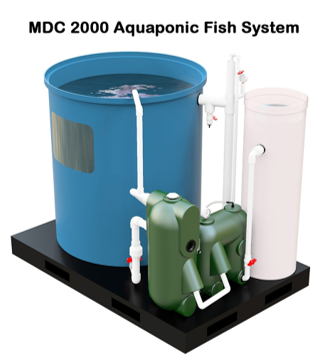FAILURE TESTING THE MODIFIED DECOUPLED RECIRCULATING AQUACULTURE SYSTEM
The Modified Decoupled (MDC) recirculating aquaculture system (RAS) is a closed system configuration with a sludge digestion capability . In aquaponics, d ecoupling the fish system from the plant system allows for independent control over water quality in both loops. T his decoupled configuration works well for schools offering aquaponics classes in a STEM program , all levels of home operations, and marine applications, like shrimp, where a high degree of water reuse is desirable. The MDC 2000 in this study was made up of a 260 gallon tank, an Endurance® 2000 floating bead filter, an airlift designed for 30% lift , and a sludge digestion basin (operated in an aerobic configuration) fed by a pneumatic exchange mechanism. The MDC 2000 was tested in house over a 7-month period and a maximum feed rate of 1 pound per day (1.33lb/ft3 media/day) was reached which was ju st shy of the goal of 1.5 lb/ft3/day. It was concluded that the system was limited by recirculation flow at feed loadings beyond 1 pound/day. This was seen in suddenly rising nitrite levels (0.061 to 3.02 ppm) as recirculation flow rate decreased (6.4 to 5.55 gpm) at a feed loading of 1 pound per day . A h igh submergence to lift ratio decreases the efficiency of an airlift . This will be addressed in trial 2 by raising the tanks in order to achieve 20% lift for the airlift.
